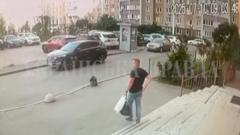In a retaliatory move, Ukraine’s Security Service announced the killing of two Russian agents after the daylight shooting of Colonel Ivan Voronych, highlighting ongoing tensions and warfare in the region.
Ukraine Claims Eliminating Russian Agents After Intelligence Officer Assassination

Ukraine Claims Eliminating Russian Agents After Intelligence Officer Assassination
Following the assassination of a senior intelligence officer, Ukraine reports the deaths of two Russian agents involved in the attack.
In a dramatic escalation of the ongoing conflict between Ukraine and Russia, Ukrainian authorities reported the deaths of two agents belonging to the Russian Federal Security Service (FSB) following the assassination of Colonel Ivan Voronych. The head of Ukraine's Security Service (SBU), Vasyl Malyuk, announced in a video statement that these agents were tracked down and subsequently "liquidated" after they resisted arrest on Sunday morning.
The incident that led to this retaliation occurred on July 10, when Colonel Voronych was shot multiple times in broad daylight in a car park in Kyiv. CCTV footage corroborated by Reuters captured the moment a man approached him before fleeing the scene shortly thereafter. The SBU stated that the agents had been surveilling Colonel Voronych prior to the attack and had obtained specific coordinates of a location where they found a pistol equipped with a silencer.
Ukraine's national police classified the two slain agents as "citizens of a foreign country," although no further details were provided about their identities. Moscow has yet to respond to these claims. The SBU, which is primarily focused on internal security and counter-intelligence functions similar to the UK's MI5, has increasingly participated in sabotage and assassination missions amid the ongoing conflict, particularly following the large-scale invasion by Russia in 2022.
Sources within Ukraine's security apparatus indicated that the SBU was also responsible for the elimination of high-ranking Russian figures, including General Igor Kirillov in December 2024, and previously linked to the April car bomb killing of General Yaroslav Moskalik in Moscow, for which the Kremlin attributed responsibility to Kyiv.
This deadly encounter unfolds against the backdrop of rising military activity, with Russian strikes on Ukraine hitting unprecedented levels. President Volodymyr Zelensky remarked that Ukraine recently faced its largest-ever Russian aerial assault, while reports from the UN indicated the highest monthly civilian casualties in three years occurred in June. Meanwhile, military engagements continue on the frontlines, with Russia attempting to reclaim ground in eastern Ukraine and the Kursk region.
Efforts towards negotiating a ceasefire have stalled, amidst the resumption of U.S. military support to Ukraine during these tumultuous times. The ongoing drone warfare has intensified, contributing to increasing alarm and diminishing morale among the Ukrainian populace.
The incident that led to this retaliation occurred on July 10, when Colonel Voronych was shot multiple times in broad daylight in a car park in Kyiv. CCTV footage corroborated by Reuters captured the moment a man approached him before fleeing the scene shortly thereafter. The SBU stated that the agents had been surveilling Colonel Voronych prior to the attack and had obtained specific coordinates of a location where they found a pistol equipped with a silencer.
Ukraine's national police classified the two slain agents as "citizens of a foreign country," although no further details were provided about their identities. Moscow has yet to respond to these claims. The SBU, which is primarily focused on internal security and counter-intelligence functions similar to the UK's MI5, has increasingly participated in sabotage and assassination missions amid the ongoing conflict, particularly following the large-scale invasion by Russia in 2022.
Sources within Ukraine's security apparatus indicated that the SBU was also responsible for the elimination of high-ranking Russian figures, including General Igor Kirillov in December 2024, and previously linked to the April car bomb killing of General Yaroslav Moskalik in Moscow, for which the Kremlin attributed responsibility to Kyiv.
This deadly encounter unfolds against the backdrop of rising military activity, with Russian strikes on Ukraine hitting unprecedented levels. President Volodymyr Zelensky remarked that Ukraine recently faced its largest-ever Russian aerial assault, while reports from the UN indicated the highest monthly civilian casualties in three years occurred in June. Meanwhile, military engagements continue on the frontlines, with Russia attempting to reclaim ground in eastern Ukraine and the Kursk region.
Efforts towards negotiating a ceasefire have stalled, amidst the resumption of U.S. military support to Ukraine during these tumultuous times. The ongoing drone warfare has intensified, contributing to increasing alarm and diminishing morale among the Ukrainian populace.























